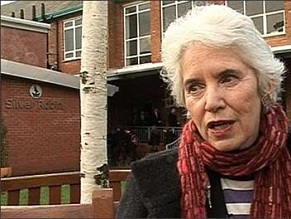|
World Jewish News

Eva Clarke was born in Mauthausen concentration camp in Austria in 1945, three days before the notorious camp’s liberation by the US Army, and along with her mother was the only survivor of 15 members of her immediate family who perished at Auschwitz.
|
Holocaust Educational Trust extends training programme to Gibraltar
12.12.2012, Holocaust British charity Holocaust Educational Trust (HET) conducted an outreach programme in Gibraltar last week as part of its ongoing teacher training programmes to better equip educators with the skills to deliver Holocaust educational programmes in their schools.
The three-day trip, conducted in conjunction with Holocaust survivor Eva Clarke, featured a meeting between Clarke and Chief Cabinet Minister Fabian Picrdo, as well as a survivor testimony to the 750-strong local Jewish community and 400 local students, and was designed an extension of the charity’s work in the UK.
British territory Gibraltar follows the English National Curriculum, and as such as Holocaust education is mandatory for students aged 11-14.
Speaking of the HET initiative, Picardo said he was grateful to them for providing access to direct testimony from a Holocaust survivor, “because I want this respect for other races to endure in Gibraltar and I hope that a similar respect for other races can be shared by the rest of the world”.
Meanwhile HET Chief Executive Karen Pollock paid tribute to the Gibraltarian government’s participation as a sign of “the significance it places on Holocaust education”.
Clarke was born in Mauthausen concentration camp in Austria in 1945, three days before the notorious camp’s liberation by the US Army.
Along with her mother she was the only survivor of 15 members of her immediate family who perished at Auschwitz.
After the war, Clarke emigrated to the UK with her mother and new stepfather, where she has lived ever since, becoming active in the HET’s extensive range of programmes, comprising the delivery if the annual Holocaust Memorial Day, the Outreach programme of relaying survivors’ testimonies in schools, teacher training programmes and post-16 visits to Auschwitz.
EJP
|
|
